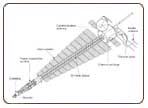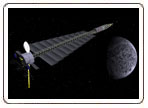Air-Attack.com > Space > Jupiter Icy Moons Orbiter(JIMO)
Jupiter Icy Moons Orbiter(JIMO)
- Ion Thrusters Propel NASA into Future
- NASA's Prometheus: Fire, Smoke And Mirrors
- TSR: Revisiting Project Orion
- Prometheus Pre-empted? New Nuclear Fission Missions Evaluated
- Hamilton Sundstrand to Provide Key Technology for Jupiter Icy Moons Orbiter
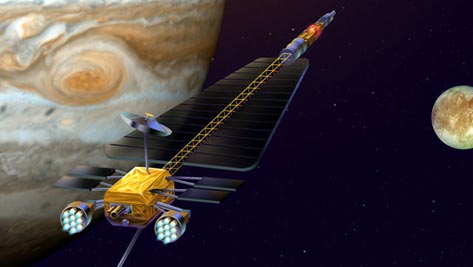
Mission
NASA has issued its mission design requirements to three industry teams for a proposed mission to Jupiter and its three icy moons. The requirements are also the first product formulated by NASA's new Office of Exploration Systems in Washington. The Jupiter Icy Moons Orbiter is a spacecraft with an ambitious proposed mission that would orbit three planet-sized moons of Jupiter -- Callisto, Ganymede and Europa -- that may harbor vast oceans beneath their icy surfaces. The mission would be powered by a nuclear reactor and launched sometime in the next decade.
The JIMO mission also would raise NASA’s capability for space exploration to a revolutionary new level by pioneering the use of electric propulsion powered by a nuclear fission reactor. This technology would not only make it possible to consider a realistic mission for orbiting three of the moons of Jupiter, one after the other, it also would open the rest of the outer Solar System to detailed exploration in later missions.
Project Constellation & Project Prometheus
Associate Administrator retired Rear Adm. Craig E. Steidle of NASA's Office of Exploration Systems said, "The Jupiter Icy Moons Orbiter requirements represent our new way of doing business, tracing exploration strategies to the technology maturation programs that will enable this exciting mission and the other missions that make up Project Constellation." Project Constellation, as it is called, will embody the agency's latest reach for the stars and officials have begun by trying to speed up the normally slow-paced process of defining spaceship designs and issuing contracts to create them.
In 2003, NASA's Project Prometheus was established to develop technology and conduct advanced studies in the areas of radioisotope power system and nuclear power and propulsion for the peaceful exploration of the solar system.
The JIMO System
The JIMO space system is
composed of three basic modules:

One conceptual design for the Jupiter Icy Moons Orbiter would place a large array of heat-shedding radiator panels between the spacecraft's power source and ion-propulsion thrusters.
- The reactor module, consisting of the reactor, its radiation
shield, a re-entry shield, and the reactor instrumentation and control;
- The space system module,
consisting of the space system bus, reactor power conversion and heat transfer segment, electric
propulsion, and the launch vehicle adapter;
- and the mission module, consisting of all missionunique subsystems, including the science instruments, their support structures, and any auxiliary payload.
Power System
In order to explore the distant reaches of the solar system, new technologies must be developed. These technologies would allow spacecraft to travel further and conserve more energy until they reach their destination.
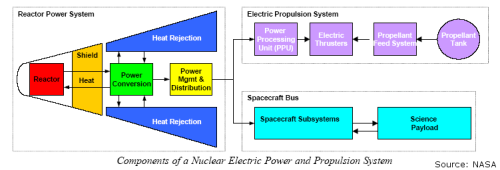
Developing a safe nuclear power capability would enable NASA to meet its scientific goals for the next several decades and more thoroughly explore the outer edges of the solar system. The Jupiter Icy Moons Orbiter Mission would demonstrate that a nuclear fission reactor can be developed for use in deep space, flown safely, and operated reliably on long-duration missions in the deep space environment to return valuable science. A nuclear fission reactor could produce unprecedented amounts of electrical energy to significantly improve scientific measurements, mission design options, and telecommunications capabilities. The expanded scientific capabilities would allow radar to penetrate deep into icy surfaces and allow extensive surface mapping in enough detail to see features as small as a house.
Boeing Design
On July 27th, 2004 Boeing delivered its conceptual design proposal for the JIMO.
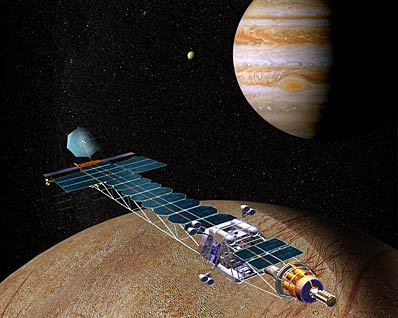
An artist's concept shows the JIMO spacecraft at Europa. Credit: Boeing
The JIMO reactor would provide more than 100 times more usable onboard power than has been available to previous science probes and demonstrate nuclear reactors can be operated safely and reliably in space to provide electrical power needed for propulsion and scientific exploration.
"Through Project Prometheus, NASA is developing space nuclear power and electric propulsion technologies that have the potential to revolutionize space exploration. As envisioned, JIMO would change how humans explore the solar system," said Mike Mott, Boeing NASA Systems vice president and general manager. "The Boeing team has the large-scale systems integration capability and experience to make it a success."
Links & Sources
NASA Jupiter Icy Moons Orbiter Mission Home PagePDF: Project Prometheus Frequently Asked Questions
PDF: NASA fact sheet
PDF: Technology and Applications of Space Fission Reactors Systems
PDF: Use and Safety of Space Fission Reactors Systems
Ion Propulsion Tutorial Activity
Boeing submits design proposal for Jupiter probe
NASA JIMO Resources - Jupiter Icy Moons Orbiter


